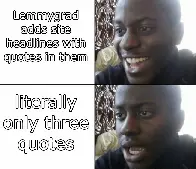Meta meme
Meta meme


“No investigation, no right to speak. Unless you have investigated a problem, you will be deprived of the right to speak on it. Isn’t that too harsh? Not in the least. When you have not probed into a problem, into the present facts and its past history, and know nothing of its essentials, whatever you say about it will undoubtedly be nonsense.” – Mao Zedong, Oppose Book Worship
“It is difficult for me to imagine what ‘personal liberty’ is enjoyed by an unemployed person, who goes about hungry, and cannot find employment. Real liberty can exist only where exploitation has been abolished, where there is no oppression of some by others, where there is no unemployment and poverty, where a man is not haunted by the fear of being tomorrow deprived of work, of home and of bread. Only in such a society is real, and not paper, personal and every other liberty possible.” – J. V. Stalin, Interview Between J. Stalin and Roy Howard
“Have these gentlemen ever seen a revolution? A revolution is certainly the most authoritarian thing there is. It is the act by which one part of the population imposes its will on the other part by means of rifles, bayonets and cannons — by the most authoritarian means possible; and the victors, if they do not want to have fought in vain, must maintain this rule by means of the terror which their arms inspire in the reactionaries.” – Friedrich Engels, On Authority



